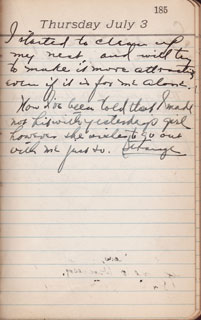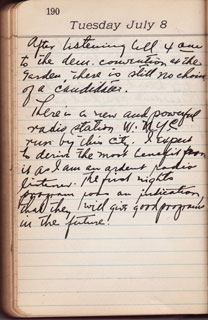
Dull
————–
Matt’s Notes
Papa have still been on a forced break from work due to his factory’s “slack season,” and he never enjoyed idleness. I wonder, too, if the ongoing stasis at the Democratic Convention, delivered through his radio in all its grinding detail, had started to affect his mood.
The New York Times characterized the convention galleries as in a “deep depression” expressed “through the afternoon by a curious lowing noise.” Granted, the Times writer may have just needed some sort of hook for yet another article about a convention that was supposed to have adjourned a week earlier, but the proceedings probably felt genuinely boring after the previous days’ ballot swings and delegate-on-delegate fisticuffs.
Meanwhile, some other New York Times headlines that might have caught Papa’s eye as he listened to the Convention included:
- NEW LAW TIGHTENS CONTROL OF AUTOS; Every Motorist in State Must Be Examined for a License Before Oct. 1. – Up until now, New York State had not required automobile drivers to carry a license. Other provisions of the law decreed “brakes and steering mechanism must be in good order and a suitable horn must be provided”; “a muffler must be used”; “two white headlights of twenty-one candlepower each must be carried on all vehicles”; “all motor vehicles carrying ten or more passengers must have fire extinguishers”; and “trucks must have a mirror adjusted to give a view of the traffic in the rear.” Does that last requirement imply that most cars in 1924 were operating without rear-view mirrors?
- CELEBRATE OPENING OF SUBWAY LINK; Civic and City Officials Ride in First Train Over 14th St. Line to Brooklyn. – Looks like this “Fourteenth Street-Eastern District subway,” which ran from 6th Avenue and 14th Street in Manhattan to Montrose and Bushwick Avenues, was the first manifestation of today’s storied L line. New York Mayor Hylan used the opening ceremonies to restate his case for transferring control of New York’s Subways from private companies to a municipal body.
- GIANTS BEAT ROBINS FOR 12TH TIME, 7-5; Sharp Fielding Behind Nehf and Jonnard and Timely Hitting Result in Victory – The Giants beat writer for the Times remains my favorite of all their baseball reporters. Today he said the Giants “put a horseshoe in the glove yesterday and knocked the Robins to a sitting position for the twelfth time this season,” among other colorful turns of phrase.
- CALLS LEAGUE PLANK FATAL.; Senator Willis Asserts It and Split Will Defeat Democrats. – The debate over whether to call out the Ku Klux Klan by name in the Democratic platform’s anti-bigotry plank was the convention’s most contentious, but running a close second was the question of whether or not to endorse the League of Nations in the platform. The final platform did not include such language, and I imagine this was a great disappointment to Papa who, like Senator Willis, was a great admirer of Woodrow Wilson’s dedication to the League. Said Willis: “They have kicked the memory of Woodrow Wilson into the discard. They have been forgetful of the memory of Woodrow wilson for expediency’s sake.”
- PEACE SEEMS NEAR IN GARMENT STRIKE; New Manufacturers’ Exchange Signs an Agreement With Workers. – The Amalgamated Clothing Workers strike that began on June 25th came to an early end as the union won a number of concessions on minimum pay and unemployment insurance. I thought at first that Papa may have been a member of the Amalgamated and therefore sitting out work due to the strike, but I’m sure he would have written something about it.
References:
- FIRST BLOW STRUCK IN MISSOURI CLASH; Delegate, Charging Prevalence of McAdoo Money, Lands on Another, Calling Him a “Liar.”





 from all over. But now, in addition to what they could see, New Yorkers had the odd, new ability to witness the raw goings-on inside the Garden. There simply had never been anything like it. The ubiquity must have been disorienting, maybe even thrilling. How did it feel? Like a child tasting ice cream for the first time? A blind person suddenly seeing a rainbow? (Or, more appropriately, someone discovering e-mail in the early 90’s?) What was it, exactly, they were a part of? How were they supposed to regard it?
from all over. But now, in addition to what they could see, New Yorkers had the odd, new ability to witness the raw goings-on inside the Garden. There simply had never been anything like it. The ubiquity must have been disorienting, maybe even thrilling. How did it feel? Like a child tasting ice cream for the first time? A blind person suddenly seeing a rainbow? (Or, more appropriately, someone discovering e-mail in the early 90’s?) What was it, exactly, they were a part of? How were they supposed to regard it?